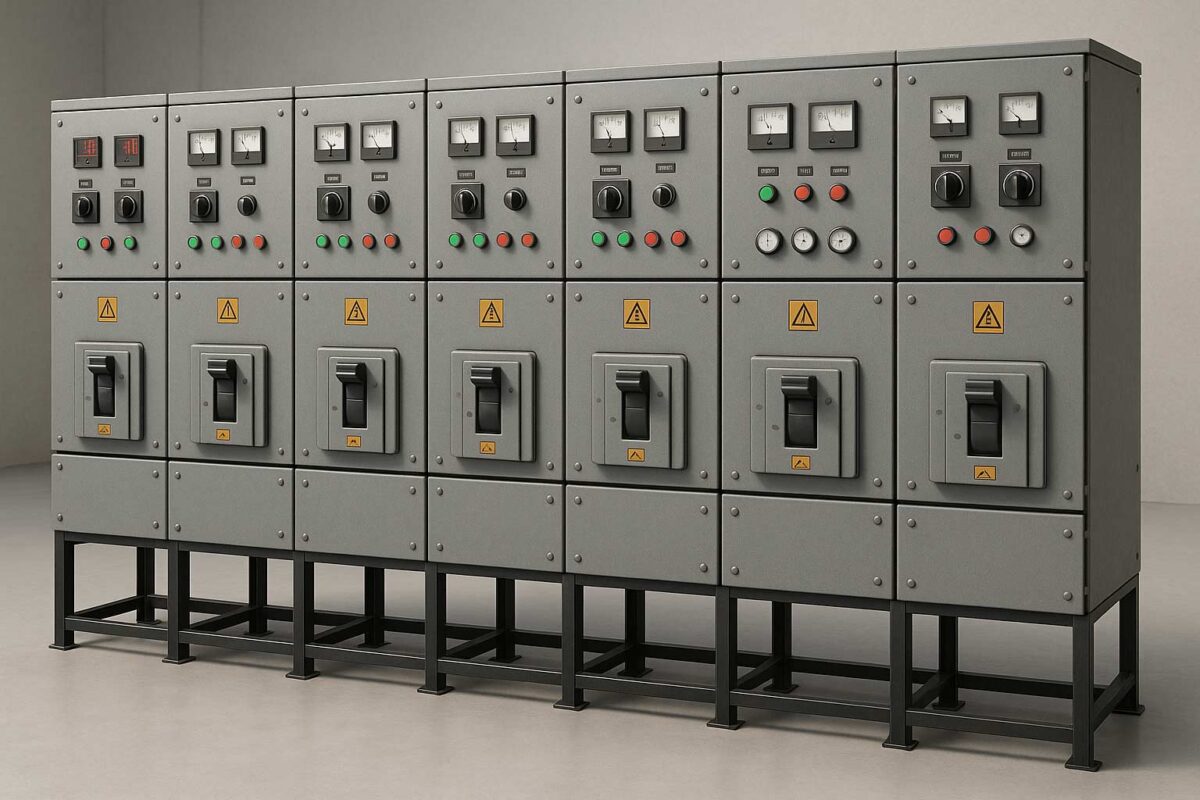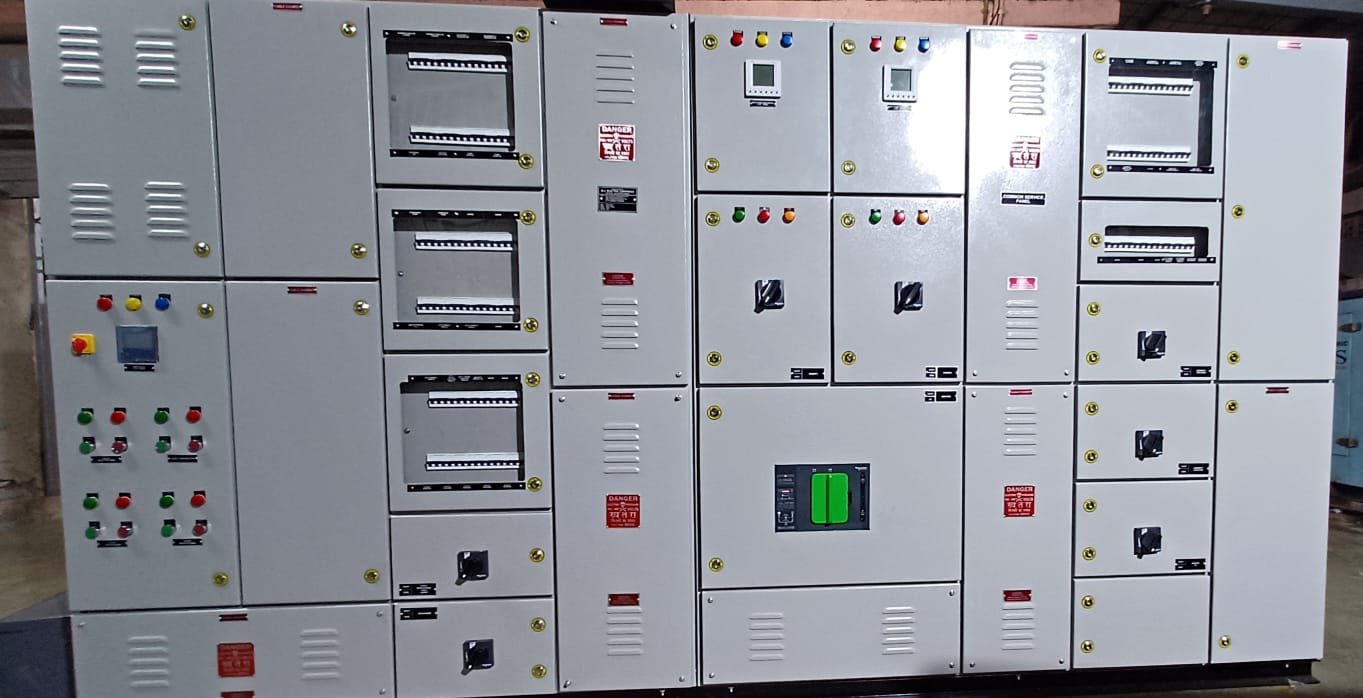BREAKER PANEL
BREAKER PANEL
Key Features:
- Main Breaker: Controls the entire power supply to the panel.
- Branch Breakers: Protect individual circuits, automatically tripping in case of overloads or short circuits.
- Compact Design: Suitable for residential, commercial, and industrial use.
- Labeling: Clearly marked circuits for easy identification.
Applications:
- Homes and apartments
- Offices and retail spaces
- Industrial machinery control
Breaker panels are the backbone of modern electrical systems, ensuring safe and efficient power distribution across various sectors. From commercial buildings to factories, and even critical environments like hospitals, pharmaceutical industries, and solar installations.
They play a vital role in maintaining uninterrupted operations. By managing the flow of electricity, these panels protect equipment, minimize downtime, and ensure safety.
At Dj Electro Controls, we take pride in being a trusted provider of breaker panels. As one of the leading electrical control panel manufacturer, we understand the need for durable, reliable, and high-performance solutions.
What Are Breaker Panels and Their Purpose?

Types of Breaker Panels for Different Applications
Main Breaker Panels
Sub Panels
Power Control Panels
Transfer Switch Panels
How Industries Use These Panels
Industries like large solar installations, factories, and dairy facilities depend on circuit breaker panels to handle their unique power needs. For instance:
- Large solar installations use specialized panels to manage the flow of energy generated by solar arrays, ensuring reliability and efficiency.
- Factories rely on durable breaker panels to protect machinery and maintain operational stability in high-demand environments.
When sourcing such solutions, businesses often look for a reliable Breaker Panels manufacturer in India or a trusted Breaker Panels supplier near me, ensuring they receive high-quality panels that meet specific industry standards.
How to Choose the Right Breaker Panel for Your Industry
1. Evaluate Load Capacity
Understanding your facility’s power requirements is the first step. Determine the total load the breaker panel will need to handle, factoring in future expansions or increased energy demands.
- For dairies, equipment like refrigeration units and processing machinery often require high-capacity breaker panels.
- In pharmaceutical facilities, precise control is needed to manage various production and laboratory equipment.
2. Identify Application-Specific Requirements
- Every industry has unique needs, and the breaker panel you choose should align with those.
- Large-scale industries:Look for panels with advanced safety features to protect against overloads and short circuits.
- Telecommunication networks:Choose panels that ensure consistent power flow to sensitive equipment.
- Solar installations:Opt for panels compatible with renewable energy setups for seamless integration
3. Ensure Compliance with Industry Standards
4. Practical Tips for Industries
Here are some additional tips based on specific industries:
- Dairies: Select panels designed to operate in humid environments. Panels with rust-resistant enclosures are ideal for long-term durability.
- Pharmaceutical facilities:Opt for panels with easy-to-monitor features, such as digital displays, to manage power for critical operations.
5. Partner with a Reliable Supplier
Benefits of Dj Electro Controls Breaker Panels
When it comes to breaker panels, quality and performance are paramount. At Dj Electro Controls, we prioritize delivering solutions that meet the diverse needs of industries while ensuring safety and efficiency. Here’s what sets our breaker panels apart:
1. Evaluate Load Capacity
- Industries across sectors trust us as one of the most reliable electrical control panel manufacturers in the market.
2. Customization for Different Industrial Needs
- High-capacity options for factories.
- Specialized designs for solar installations.
- Precise configurations for hospitals and research laboratories.
3. Cost-Effectiveness and Energy Efficiency
Our panels are designed to optimize energy consumption, reducing power wastage and operational costs. With features that promote long-term energy efficiency, our products are a smart investment for businesses looking to cut down on expenses without compromising performance.
The price of breaker panels in India varies depending on several factors, including:
Industrial Applications We Serve
Estimated Price Range:
- Standard Breaker Panels: ₹5,000 – ₹25,000
- Industrial Breaker Panels: ₹30,000 – ₹1,50,000 or more
- Custom Panels with Advanced Features ₹1,50,000 – ₹5,00,000+
Where to Buy
Why Choose Dj Electro Controls?
Maintenance and Safety Tips for Breaker Panels
While the upfront cost of a Warehouse Panel includes engineering, materials, and testing, the long-term return on investment is significant
Why Regular Maintenance is Important
Breaker panels are the backbone of your electrical system, and any malfunction can disrupt operations. Routine maintenance ensures:
- Optimal Performance: Prevents power disruptions by identifying potential faults early.
- Safety Reduces risks of electrical hazards, such as short circuits or overloads.
- Longevity Prolongs the lifespan of the circuit box and associated equipment.
Maintenance Checklist for Safety and Performance
Follow this checklist to ensure your breaker panels remain in top condition:
- Visual Inspection: Check for visible damage, loose connections, or signs of overheating.
- Tighten Connections: Ensure all connections are secure to avoid sparks or power loss.
- Dust and Debris Removal: Clean the panel regularly to prevent blockages or fire hazards.
- Test Breakers: Conduct regular tests to confirm that each breaker trips as expected during faults.
Common Issues and How to Address Them
Breaker panels can experience various issues over time. Here’s how to tackle them:
- Frequent Tripping: This could indicate overloaded circuits or faulty breakers. Redistribute the load or replace faulty breakers.
- Corrosion Humid environments can cause rusting. Use panels with corrosion-resistant enclosures and replace damaged parts immediately.
- Overheating: Excess heat may result from loose connections or overloaded circuits. Tighten connections and ensure proper ventilation.
FAQs
Q1. What are breaker panels used for?
Q2. How to choose the right breaker panel for a factory setup?
When selecting a breaker panel for a factory, consider:
- Load Capacity: Ensure the panel can handle the power demand of machinery and equipment.
- Customization: Opt for panels tailored to your operational needs.
- Compliance: Choose products certified to meet safety and industry standards.
Q3. What are the different types of breaker panels?
Basic inspections should be done quarterly. Breaker testing, earth resistance measurement, and thermographic scanning should occur annually. Filters and dust-proofing elements may need monthly checks in high-dust zones.
- Main Breaker Panels: Centralize control for the entire facility.
- Sub Panels: Distribute power to specific areas or equipment.
- Transfer Switch Panels: Manage power between primary and backup sources.
Q4. How often should breaker panels be inspected?
Yes, provided the incoming wiring and load termination are assessed. We also recommend verifying earthing and insulation resistance before panel commissioning.
- Main Breaker Panels: Centralize control for the entire facility.
- Sub Panels: Distribute power to specific areas or equipment.
- Transfer Switch Panels: Manage power between primary and backup sources.
Q5. What is the cost of breaker panels for industrial use?
Q6. How do breaker panels differ from electrical control panels?
Q7. Why should I choose Dj Electro Controls for breaker panels?
- Quality: High-grade materials ensure durability and safety.
- Customization: Solutions designed to meet specific industrial needs.
- Support Excellent customer service and technical expertise.



